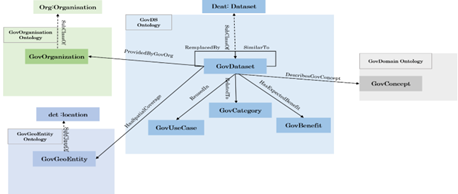Ontology-based Knowledge Representation for Open Government Data
Keywords:
Open government data, ontologies, knowledge representation, discoverabilityAbstract
Open Government data present valuable knowledge that supports political, social, and economic value creation. The number of available OGD datasets has increased significantly with pressure being put on government administrations to open up their data. This makes the task of discovering relevant datasets difficult and time-consuming. Improving data discoverability has a significant impact in improving OGD usage. As improving discoverability relies on improving metadata representation, we explore in this paper the usage of ontologies as a knowledge representation formalism to provide a rich and semantically enhanced representation of OGD metadata that enables its processability and interpretability by machines. Our knowledge representation model covers the essential kinds of knowledge necessary for the description of OGD datasets (descriptive, technical, contextual and structural). Based on the semantic model, we propose an approach to transform OGD metadata in a semantically enhanced RDF graph. This graph will serve as a ground basis to implement a semantic search mechanism to improve data discoverability on OGD portals.
Downloads
References
Attard, J., Orlandi, F., Scerri, S., & Auer, S. (2015). A systematic review of open government data initiatives. Government information quarterly, 32(4), 399-418.
Ubaldi, B. (2013). Open government data: Towards empirical analysis of open government data initiatives.
Janssen, M., Charalabidis, Y., & Zuiderwijk, A. (2012). Benefits, adoption barriers and myths of open data and open government. Information systems management, 29(4), 258-268.
DAHBI, K. Y., Lamharhar, H., & Chiadmi, D. (2019, October). Toward a user-centered approach to enhance Data discoverability on Open Government Data portals. In 2019 Third International Conference on Intelligent Computing in Data Sciences (ICDS) (pp. 1-5). IEEE.
Kremen, P., & Necasky, M. (2018). Improving discoverability of open government data with rich metadata descriptions using semantic government vocabulary.
Dublin Core Metadata Initiative. (2012). Dublin core metadata element set, version 1.1.
World Wide Web Consortium. (2014). Data catalog vocabulary (DCAT).
Alexander, K., Cyganiak, R., Hausenblas, M., & Zhao, J. (2011). Describing linked datasets with the VoID vocabulary.
Albertoni, R., & Isaac, A. (2021). Introducing the data quality vocabulary (DQV). Semantic Web, 12(1), 81-97.
Garijo, D. (2013). PROV-O: The PROV Ontology Tutorial.
Gruber, T. (2018). Ontology.
Dekkers, M., Kotoglou, S., Nelson, C., Hohn, N., Pellegrino, M., & Peristeras, V. StatDCAT-AP.
Perego, A., Cetl, V., Friis-Christensen, A., & Lutz, M. (2017). GeoDCAT-AP: Representing geographic metadata by using the “DCAT application profile for data portals in Europe”. In Joint UNECE/UNGGIM Europe Workshop on Integrating Geospatial and Statistical Standards, Stockholm, Sweden.
The organization ontology . https://www.w3.org/TR/vocab-org/
Dimou, A., Vander Sande, M., Colpaert, P., Verborgh, R., Mannens, E., & Van de Walle, R. (2014, January). RML: a generic language for integrated RDF mappings of heterogeneous data. In Ldow.

Downloads
Published
How to Cite
Issue
Section
License

This work is licensed under a Creative Commons Attribution-ShareAlike 4.0 International License.
All papers should be submitted electronically. All submitted manuscripts must be original work that is not under submission at another journal or under consideration for publication in another form, such as a monograph or chapter of a book. Authors of submitted papers are obligated not to submit their paper for publication elsewhere until an editorial decision is rendered on their submission. Further, authors of accepted papers are prohibited from publishing the results in other publications that appear before the paper is published in the Journal unless they receive approval for doing so from the Editor-In-Chief.
IJISAE open access articles are licensed under a Creative Commons Attribution-ShareAlike 4.0 International License. This license lets the audience to give appropriate credit, provide a link to the license, and indicate if changes were made and if they remix, transform, or build upon the material, they must distribute contributions under the same license as the original.





